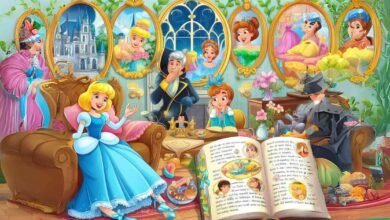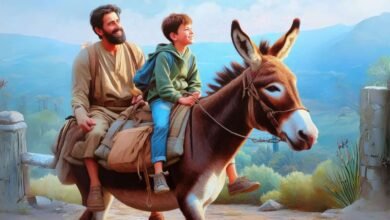The cannon of peace

In Russia, a famous bell-founder named Sergei Vassilevitch Varbaratov lived. The sound of their bells was so harmonious that, whenever they rang, even angels would stop to hear them.
Sergei Vassilevitch was married to a tall, stout woman named Natalia Sofia and had two children. One was named Leonid Michail and was a good-natured boy. Still very young, already helped in the workshop. Before long, he learned all the secrets of the art of bell casting. The other son, Vladimir Nikolai Varbaratov, was, however, a singular child. He fled his father’s workshop, stuck his nose in dusty books, mingled with the servants and servants, and experimented with all kinds of flowers, herbs, and vegetables on his father’s grounds.
“If he were tall and strong like his brother,” sighed his father, “I could still buy him a farm for him to earn a living …”
But Vladimir Nikolai was not tall and strong, but of fragile complexion, and in no way resembled a farmer. Not knowing what to do with his youngest son, his father often raised his eyes to heaven and exclaimed:
“God only knows what will happen to the boy!”
“Saint Barbara, intercede for him,” her mother added, addressing the patron saint of the bell-ringers.
That was how time went by, and Sergei Vassilevitch’s concerns grew from year to year.
One winter a Tsar envoy came to Sergei Vassilevitch’s house: he was to report to the castle without delay. Surely this is an order for a new bell, Sergei Vassilevitch thought. Satisfied, he put on his beautiful mink skin and rode the sleigh to Moscow, where the Tsar was waiting for him in person.
But this time it was not a bell. On the contrary, the Tsar referred to him as a serious problem: the Tartars constantly attacked the border villages, looted the fields and the people.
“They are getting bolder,” roared the Tsar. “I don’t know how to protect my kingdom.”
“My art is not of much help here either, My Lord,” said Sergei Vassilevitch. “The bells announce peace, not war.”
“You’re right,” the Tsar admitted, “but it’s said all over the country that no one knows the art of metal casting as much as you do.” I ask you to make me a cannon so large and powerful that none on earth will match it. I want to put it in the valley where the Tartars enter. It will roar like thunder and, like lightning, bring down enemies. At the sight of their bullets, the Tartars will be forced to flee back to the mountains.
“I never made a cannon, My Lord,” objected fear Sergei Vassilevitch.
The bell-caster’s hesitation did not please the Tsar.
“But I can try anyway,” Sergei added quickly as he saw the Tsar’s expression of discontent.
He spent weeks and weeks making plans with his eldest son. When spring came, it was ready. The clay mold was baked and the oven was lit. The ore was ready to be melted. On the day of the foundry, the Tsar came personally in his golden carriage, accompanied by some generals, to see what Sergei Vassilevitch had designed.
With huge casseroles a large amount of ore was poured into the pan. The gases hissed out of the openings in the pipe. Finally, after many hours, the metal cooled and the mold was carefully broken. Then came the largest and most impressive cannon barrel the world had ever seen. The surface was covered with the most splendid relief figures.
The Tsar thoroughly appreciated that work of art. What most admired her was the image of Saint Barbara. Drawn on the back of the barrel, one hand rested on a tower while the other held a flowering branch.
“If the cannon were not so urgent because of the threat of the Tartars,” said the Tsar, “only for this image of Saint Barbara would I have a place of honor in my castle.” It will be baptized with the name of Santa Barbara Cannon.
“That won’t please Santa Barbara, who knows how bitter wars and violent deaths are,” Natalia Sofia could not help muttering.
The barrel was hoisted with a crane and attached to the cart, to which sixteen strong horses were harnessed, which only after great effort could set that monster in motion.
The Tsar turned to Sergei Vassilevitch and said:
– You’re a great foundry master, Sergei Vassilevitch Vabaratov. You have created a magnificent work, so I want to fulfill your desire. Whatever you wish will be granted to you.
Sergei Vassilevitch reflected at length. The gaze settled on the youngest son, Vladimir Nikolai, discreetly removed.
– My Lord, I thank you for this mercy. I really have a great wish. My son Vladimir Nikolai, who you see there, is not gifted for foundry. I am not sure what to do with him, which causes me much pity and distress. If you made him colonel of the Santa Barbara cannon and the gunners, you would take a heavy weight off me.
The generals who accompanied the Tsar laughed at that wish.
“The promised must be fulfilled,” said the Tsar.
And Vladimir Nikolai was dressed in a splendid uniform and shod with soft leather boots. Riding his piebald horse, he did look like a little colonel.
Luckily, the gunnery group belonged to an experienced old corporal who understood the craft. The cannon was set in motion along with seventy-seven heavy bullets and two cars overflowing with gunpowder bags. Vladimir Nikolai did not turn to his parents once, so that the tears would not be seen. Russia is a vast country like the sky. It was not until many weeks later that the group arrived with their heavy cannon at the valley the Tartars used to pass when they invaded the country. The cannon was placed on a gentle hill in the grass. He reigned from above like a violent fierce dragon, gleaming in the sun. The corporal had a solid tower built where he stored the gunpowder bags and the seventy-seven cannonballs. He also set up watchmen to signal if groups of Tartars approach. Vladimir Nikolai showed no great interest in all these things. He walked around the cannon, crumbling the dark earth with his fingers as he murmured to himself: – The earth is rested and good. It is ideal ground for golden wheat. Occasionally a Tartar would appear, and sometimes two or three, mounted on a small horse. The corporal thought that for so few people it was not worth carrying the cannon. Instead, he preferred to display it, boasting: – With a single shot, the Santa Barbara cannon kills a hundred people or more. He had one of the seventy-seven heavy bullets brought from the tower to admire and touch. The Tartars, however, did not dare approach the cannon. This admirable weapon impressed them immensely and in their tents they reported in detail what they saw. That year there was not a single attack in the entire region. Meanwhile, artillery soldiers had dug a fountain, built wooden houses with colorful fences around it. Although it continued to glow like pure gold, the cannon was cleaned once a week. Finally all the work is done. The gunners were lying lazily in the sun and some had already gained a belly. The sixteen horses had also become rounder, heavier and lazier. Winter has come. Suddenly Vladimir Nikolai began to bustle. In the nearest village he had found a good blacksmith who had seven plows made from seven bullets. To spark the smithy fire, the blacksmith would occasionally scatter some gunpowder through the flames, but only enough to keep the house from blowing up. The cable had authorized: seventy bullets remained sufficient. As spring drove winter away, Vladimir Nikolai plucked the soldiers from their idle life. He had them plow their horses and plow the land that stretched out of sight. Most of the soldiers had been born in the field and knew how to cut furrows in a straight line. At the Colonel’s behest they scattered carefully chosen wheat grain seeds. After a short while the cannon was in the midst of a wavy, blond crop. Time helped Vladimir Nicolai. By the end of August the harvest was completed and the grain was spotted. But where to store such an abundant harvest? Without hesitation Vladimir Nicolai had all the bullets removed from the tower and put the gunpowder bags in a wooden tent. He then stored the cereal in the tower. Tartars came more and more often. All year long they had watched what the soldiers were doing. Vladimir Nikolai was affable. He offered them wheat, for the harvest had been so great that not in three years would the soldiers and the sixteen horses consume it. – Don’t you want to sow some grain too? Asked Vladimir Nikolai one day to the Tartars who had gone to fetch some sacks of cereal. – Let’s ask – and they galloped off. A day later, many strangers arrived riding their little horses. The corporal ordered the cannon to be hurriedly loaded. But in the tent the gunpowder had moistened and the gun would never fire. It was not necessary either. The Prince of Tartars rode among his wild-looking crowd, magnificently dressed in fur and bearing a chain of bear claws around his neck. Vladimir Nikolai kindly received him, offered him a glass of wine, and asked: – So what are you going to do? Will they also plow the earth, sow and reap? – We would like to cultivate the land but we cannot do it with our hands. We have no plows or seeds, ”said Prince Tartarus. – This resolves quickly. Promised Vladimir Nikolai. He had forty-nine bullets fused to make plows. “Now I only have twenty-one cannonballs and not even a dry powder crumb,” thought the corporal, very concerned. “Hopefully the Tartars don’t attack us.” The Tartars did not think so. In the spring they began plowing and sowing, and were finally able to harvest their own cereal. But in their tents there was no place for so many sacks of grain and they began to build solid houses. Vladimir Nikolai ordered the soldiers to help them. The soldiers eventually recognized that the Tartars weren’t as scary as they had thought. Some even married beautiful Tartar women. – Why did they rob villages? Asked the soldiers from time to time. “It was hunger and need that forced us,” they answered. And some confessed that it was also a taste for adventure. After three years, the Tsar sent a messenger. Vladimir Nikolai Varbaratov was promoted to general and received a gold medal, for all those years there had not been a single complaint of attacks by the Tartars in Moscow. The Tsar later ordered the Santa Barbara cannon to be taken to his castle, where he can still be seen today. The gunners then chose St. Barbara as their patron saint, for a cannon that never has to fire bullets is the dream of peace for most soldiers… The Tsar called Vladimir Nikolai to the court and appointed him his advisor. Sergei Vassilevitch Varbaratov and his wife, Natalia Sofia, were happy with their two children and did not know who to be proud of if the robust bell-founder Leonid Michail and the clever founder of Vladimir Nikolai. Willi Fährmann Folget dem Stern München, Omnibus, 2004 (Translation and Adaptation)



